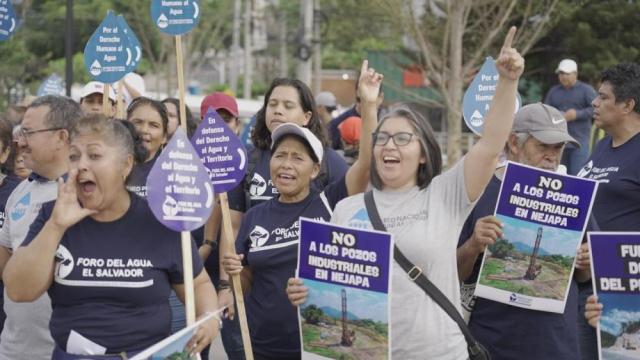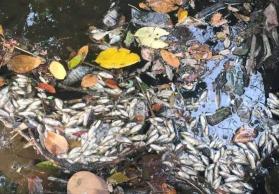Rural Water Boards in Danger as Government Props Up For-Profit Exploitation
During the week of March 18, organizations in El Salvador marked International Water Day by highlighting the shortcomings in the implementation of the Water Resources Law, passed in December 2021 and implemented the following July. While the law enshrines water as a human right and states plainly that “water will not be privatized under any condition,” leaders of The Water Forum and the National Network of Water Boards (REDNA) lamented that the last 20 months confirm that it has served to privilege business interests over the 2,325 local boards that provide water to a quarter of El Salvador’s population.
The struggle to enshrine access to water as a human right was a major focus of El Salvador’s social movement groups dating back to at least 2006. Representatives of the country’s leftist Farabundo Marti National Liberation Front (FMLN) in the Assembly’s Environmental Commission presented and pushed forth proposals from the country’s environmental movements in negotiations with the country’s right-wing parties which held significant power in the assembly. In 2018, following a legislative election in which right-wing parties gained increased control, the newly ARENA-controlled environmental commission quickly moved to sidestep a bill that had been painstakingly negotiated by replacing it with their own bill that would facilitate privatizing mechanisms. The move led to mass protests that forced ARENA and its allies to pull back and return to negotiations on a bill that took the demands of the social movement into genuine account.
When Nayib Bukele’s Nuevas Ideas (New Ideas) party won a super-majority in the 2021 legislative elections, the bill negotiations were summarily shelved, despite 69% of its clauses having been agreed upon by then-outgoing members of the Legislative Assembly’s Environmental Committee.
Nuevas Ideas then rushed its own bill, which became the Water Resources Law, through the legislature.The bill, passed within months of its introduction was supported by Nuevas Ideas, its right-wing allies, and one opposition legislator with family ties to the water-intensive sugarcane industry. Although consultations were held with social movement groups, churches, and universities that had been fighting for a law that guarantees water as a human right, none of their proposals were incorporated into the bill. Representatives of the Water Forum lament that “Although the bill considers the human right to water, it designates no mechanisms or institutions to implement this right. As a result, the right remains only in Article 1—as a wish, but not as policy.”
Since the proposal and approval of Nuevas Ideas’ Water Resources Law in 2021, a major point of contention has been the incorporation of El Salvador’s 2,325 local water boards. Overwhelmingly located in rural areas, where the government had not created infrastructure to ensure regular access to water (according to a 2023 UN report, only 42% of rural residents have access to drinking water), communities organized themselves to build the infrastructure and facilitate that access. Democratically elected by the communities, local water boards manage and maintain the water system for a quarter of the country’s population. Their work goes beyond providing water, according to Rosaura Rochac, president of the Hacienda San Diego Water Board in the La Libertad department. “We contribute to environmental protection, protecting the groundwater replenishment areas of our water sources, and denounce the abuses and harmful interests of companies and individuals who pollute, deforest or want to take advantage of water for human consumption or water systems for other purposes," she explains.
One of the major issues with the law that organizations like REDNA and the Water Forum highlighted at their March 18 press conference is the lack of differentiation between the community water boards and for-profit businesses. The law requires both to follow the same process of registering with the Salvadoran Water Authority (ASA), a government entity created in the 2021 law. The process is complex and requires proof of land ownership in the area where the entity accesses (or intends to access) water. In reference to the process, Alejandro Henriquez, a representative from The Water Forum stated, “We denounce ASA’s inability to consider the reality of the local water boards. How is it possible, knowing that local water boards require significant investment in order to simply function well, and knowing that they often don’t officially own the land, that ASA applies the same mechanism for water boards and businesses– two totally different entities?…We emphatically call on ASA to review that mechanism and reform it.”
For-profit businesses, with resources to hire lawyers to purchase land and navigate the legal system, have a significant advantage over the local water boards, which are usually run by poor women from rural communities volunteering their time in order to ensure access to water for their families and neighbors. Once registered, there is no daily limit to the amount of water private entities can extract.
In the words of The Water Forum’s Carlos Flores at this years’ World Water Day that “closes the cycle on 5 years [of Bukele’s presidency…] we’ve been able to see how the institutions that are responsible for guaranteeing, supervising, and safeguarding people’s rights and the vitality of El Salvador’s ecosystems, have tended to serve the oligarchy’s businesses…that ASA has been created with the sole purpose of failing to regulate our natural resources, of not being able to safeguard the lives of the Salvadoran people.”
To date, 18,740 private entities have completed the registration process with ASA and have received water use permits. Only 420, or 18%, of local water boards have been able to successfully navigate the registration process, and none have received permits to legally distribute water to the more than 1.4 million people who depend on their services.
Disadvantaged Local Water Boards also Confront Scarcity
The A.R.A Joya Galana Water Board located in Apopa, just north of San Salvador, is battling a megaproject on top of its struggle to register with ASA. The local government failed to register the land along the Chacalapa River, a natural spring, in the water board’s name. As a result, they cannot register with the ASA or receive a permit to continue providing water for 1,200 families whose water needs have been ignored by the state.
The water board has also voiced its opposition to a nearby urbanization project being carried out by the Dueñas family, a powerful member of the country’s oligarchy. On top of its strain on the existing water resources, the Angel Valley project entails significant damage to local forests, therefore reducing groundwater infiltration, harming the underground water table. Water boards and the Water Forum have spent years trying to turn the valley into a protected natural area, yet construction continues unabated.
On top of the disparity in navigating ASA’s registration process, large businesses are granted 15-year permits. Local water boards, in contrast, must renew their permit every five years. Additionally, the local water boards and for-profit businesses are charged the same rate for water usage.
When the original water bill was shelved by Nuevas Ideas legislators in 2021, the National Alliance Against Water Privatization released a list of five non-negotiables in any new water law. One of those was popular participation in the management of a new water board. While the new law requires ASA’s board to have one civil society member, members of The Water Forum are skeptical about who that person can be. The law explains that the representative must have “expertise in environmental sciences and sustainable development.” Henriquez notes that, because most local water boards are in rural areas, and that the average education level for people in rural areas is up to eighth grade, it is unlikely that water boards will be represented on the ASA Board. Worse than that, he explains, “It opens up the possibility that private businesses are represented, since they are the ones with environmental specialists who have studied water and natural resource sustainability.”
Access to water is a significant issue in Central America, and the problem is especially dire in El Salvador. Studies show that at least 90% of surface water is contaminated. Significant droughts, caused by climate change, but whose effects are intensified by a lack of government action and exploitation of water resources by big businesses, has been a major driver in migration from the region in recent years. It is estimated that, without major reforms, El Salvador is in danger of running out of fresh water in the next 80 years.
Highlighting these issues in the context of International Water Day, The Water Forum and REDNA organized a week of activities and published a report on the Water Resources Law, based on case study interviews with seven local water boards. The report highlights issues with the newly-created ASA, including indiscriminate approval of permits for water use by for profit entities, a lack of communication with local water boards, and even persecution against members of REDNA.
Among other activities, largely focused on bringing attention to and denouncing megaprojects that threaten the country’s water, the groups directed one of their demands to the Salvadoran Agrarian Transformation Institute (ISTA). Offering the example of a local water board unable to register with ASA because they do not own the land where their wells are located, they called on ISTA to transfer ownership of the land to the municipality. According to one community member, “At this point, there’s nothing we can do to register the land in which our wells are located. There are two hundred families whose livelihoods depend on the wells. And we’re worried because, what can we do if, tomorrow, they tell us that we no longer access the land where the wells are located?” Without the land title, the local water board cannot register with ASA, preventing them from securing a permit to legally distribute water.


 "I am a CISPES supporter because continuing to fight for social justice and a more people-centered country means continuing the dream and sacrifice of thousands of my fellow Salvadorans who died for that vision.” - Padre Carlos, New York City
"I am a CISPES supporter because continuing to fight for social justice and a more people-centered country means continuing the dream and sacrifice of thousands of my fellow Salvadorans who died for that vision.” - Padre Carlos, New York City

